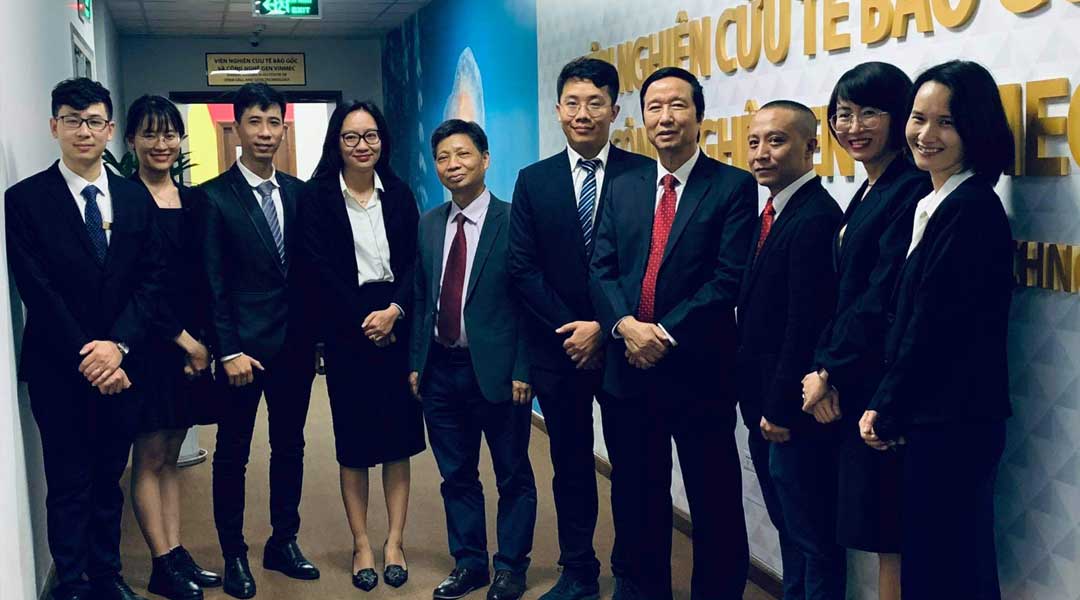Image caption: Research team from Vinmec Research Institute of Stem Cell and Gene Technology in Hanoi, Vietnam.
Durham, NC — Type 2 diabetes patients who are not overweight and who have had the disorder for less than a decade can benefit from stromal stem cells transplanted from their own bone marrow, according to a study published today in STEM CELLS Translational Medicine.
In a randomized clinical trial at Vinmec Research Institute of Stem Cell and Gene Technology in Hanoi, Vietnam, researchers investigated the safety and potential therapeutic value of administering bone marrow stromal stem cells to patients with Type 2 diabetes. In each case, the cells were autologous, or taken from the patients’ own bodies.
A total of 30 adult patients with different body mass indexes whose Type 2 diabetes histories varied from one to 25 years were recruited for the study. Each received two infusions of the cells intravenously or by injection into an artery that supplies blood to the pancreas.
Researchers monitored the patients for 48 hours and re-examined them at one-month, three-month, six-month and one-year intervals. No significant problems were detected in the patients’ health as a result of the treatment and they appeared to benefit equally from both infusion methods.
“Our patients tolerated the procedure well and showed short-term reductions in their blood glucose levels after the treatment,” said Liem Nguyen, the institute’s research director. “We also found that some of them were able to temporarily reduce the dosage of their diabetes medications.”
Some 420 million people worldwide have Type 2 diabetes, a disorder accounting for about 90 percent of all diabetes cases that often leads to disability or death. People with Type 2 diabetes cannot make good use of the insulin their bodies produce. Increased physical activity and a healthy diet can improve the disorder in some people, but many must take insulin or drugs to control their blood glucose levels.
Patients in the Vinmec study were classified into three groups based on the diabetes medicines they were regularly taking before their stem cell infusions. Some were maintaining their blood glucose levels with insulin only. Others were taking drugs but no insulin, and still others were taking a combination of insulin and drugs.
After receiving the treatment, more than half of the patients were able to lower the doses of their diabetes medicines.
“Our trial, the first to link the outcomes of autologous bone marrow stromal stem cell transplantation with body mass index and Type 2 diabetes duration, shows the procedure is safe and opens the way for other clinical trials exploring the potential benefits of this treatment in non-obese patients who have had the disorder less than 10 years,” Nguyen said.
Bone marrow stromal stem cells, also known as mesenchymal stem cells, play a key role in the body’s immune response and can transform into connective tissue cells in any organ. Over the past 50 years, they have emerged as a versatile cell source in the field of regenerative medicine.
“The results of this randomized clinical trial for patients with Type 2 diabetes and the injection of their own bone marrow stromal stem cells is encouraging and potentially may add to the treatment arsenal for this chronic disease that affects so many worldwide,” said Anthony Atala, M.D., Editor-in-Chief of STEM CELLS Translational Medicine and director of the Wake Forest Institute for Regenerative Medicine. “Of special interest is the short-term efficacy in patients with a history of Type 2 diabetes for less than 10 years and a bone mass index of less than 23. This work opens opportunities for future research to further investigate this area of work.”
###
The full article, “Type 2 Diabetes Mellitus Duration and Obesity Alter the Efficacy of Autologously Transplanted Bone Marrow-derived Mesenchymal Stem/Stromal Cells,” can be accessed at https://stemcellsjournals.onlinelibrary.wiley.com/doi/abs/10.1002/sctm.20-0506.
About STEM CELLS Translational Medicine: STEM CELLS Translational Medicine (SCTM), co-published by AlphaMed Press and Wiley, is a monthly peer-reviewed publication dedicated to significantly advancing the clinical utilization of stem cell molecular and cellular biology. By bridging stem cell research and clinical trials, SCTM will help move applications of these critical investigations closer to accepted best practices. SCTM is the official journal partner of Regenerative Medicine Foundation.
About AlphaMed Press: Established in 1983, AlphaMed Press with offices in Durham, NC, San Francisco, CA, and Belfast, Northern Ireland, publishes two other internationally renowned peer-reviewed journals: STEM CELLS® (http://www.StemCells.com), celebrating its 39th year, is the world’s first journal devoted to this fast paced field of research. The Oncologist® (http://www.TheOncologist.com), also a monthly peer-reviewed publication, entering its 26th year, is devoted to community and hospital-based oncologists and physicians entrusted with cancer patient care. All three journals are premier periodicals with globally recognized editorial boards dedicated to advancing knowledge and education in their focused disciplines.
About Wiley: Wiley, a global company, helps people and organizations develop the skills and knowledge they need to succeed. Our online scientific, technical, medical and scholarly journals, combined with our digital learning, assessment and certification solutions, help universities, learned societies, businesses, governments and individuals increase the academic and professional impact of their work. For more than 200 years, we have delivered consistent performance to our stakeholders. The company’s website can be accessed at http://www.wiley.com.
About Regenerative Medicine Foundation (RMF): The non-profit Regenerative Medicine Foundation fosters strategic collaborations to accelerate the development of regenerative medicine to improve health and deliver cures. RMF pursues its mission by producing its flagship World Stem Cell Summit, honouring leaders through the Stem Cell and Regenerative Medicine Action Awards, and promoting educational initiatives.

